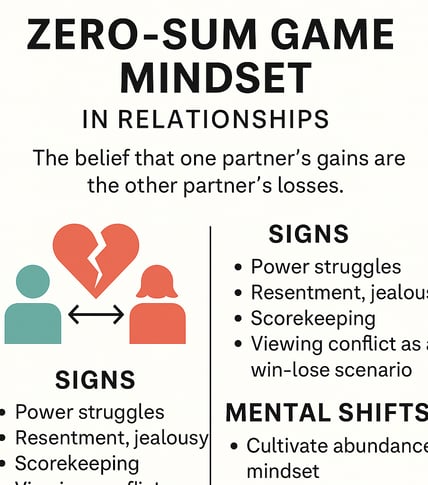The Zero-Sum Game Mindset in Relationships: A Hidden Barrier to Connection
The Zero-Sum Game Mindset in Relationships: A Hidden Barrier to Connection
Reza Eskandari MACP, Registered Psychotherapist
4/9/20253 min read


In intimate relationships—whether romantic, familial, or even professional—many conflicts stem not just from surface disagreements, but from deeper, often unconscious mindsets that shape how we perceive others and ourselves. One of the most damaging of these is the "zero-sum game" mindset.
What Is a Zero-Sum Game?
The term "zero-sum game" comes from game theory and economics. In such a system, one person’s gain is seen as another person’s loss. The total "value" remains constant—if one party wins, the other must lose. While this model may work in competitive sports or business negotiations, it becomes deeply destructive when applied to human relationships.
In a relationship shaped by a zero-sum mindset, partners may view needs, attention, power, or emotional resources as limited, fostering competition rather than collaboration. One person’s success, joy, or need fulfillment is unconsciously perceived as a threat to the other’s well-being.
How It Shows Up in Relationships
This mindset can manifest in subtle or overt ways. Consider the following examples:
Power Struggles: One partner feels that compromising means "losing" or being weak. So both dig in their heels to "win" the argument, rather than seeking mutual understanding.
Recognition Rivalry: If one partner is praised (e.g., for being a great parent), the other feels overshadowed or unappreciated, rather than proud or supportive.
Emotional Withholding: Expressing vulnerability is seen as giving the other person an "advantage," so emotions are concealed as a form of self-protection.
Scorekeeping: Each partner keeps mental tabs on favors, sacrifices, or wrongdoings to ensure the "balance" isn’t tipped in the other’s favor.
In each of these cases, the relationship is viewed through a lens of scarcity—where connection becomes a transaction rather than a shared experience.
Psychological Roots of the Zero-Sum Mindset
The zero-sum approach is often rooted in early attachment experiences, unmet emotional needs, or family-of-origin dynamics that taught the individual that love, attention, or safety had to be earned or competed for.
Insecure attachment styles, particularly anxious-preoccupied or fearful-avoidant, may fuel such beliefs. Additionally, societal values around independence, achievement, and competition (especially in Western cultures) reinforce the idea that "winning" is essential—even at the cost of mutual well-being (Mikulincer & Shaver, 2007).
When partners bring these internalized patterns into the relationship, they may unconsciously believe:
"If you get your way, I don’t matter."
"If you’re happy, there must be less for me."
"I must protect myself by not giving too much."
Why It’s Destructive
The zero-sum mindset erodes the foundation of trust, empathy, and emotional safety—key ingredients of any healthy relationship (Gottman, 2011). Instead of experiencing the relationship as a secure base, partners live in emotional scarcity and constant calculation. Over time, this leads to:
Emotional withdrawal
Passive-aggressive behaviors
Conflict escalation
Lack of intimacy and reciprocity
It becomes difficult for partners to co-regulate or meet each other’s emotional needs because both are trying to protect their "half of the pie"—which they mistakenly believe is finite.
From Zero-Sum to Win-Win: The Shift in Mindset
Healthy relationships are not zero-sum—they are non-zero-sum systems where both partners can grow, feel valued, and meet their needs without diminishing the other.
Key Shifts Include:
Abundance Over Scarcity:
Begin to see love, attention, and validation as expandable, not limited. One partner’s happiness or success can enhance the relationship rather than detract from it.Mutual Empowerment:
Focus on shared goals, not individual victories. Ask, "How can we both get our needs met?"Transform Conflict into Dialogue:
Conflict isn’t a battle to win—it’s a signal of unmet needs or unhealed wounds. Use structured dialogue tools(e.g., Imago’s Intentional Dialogue or Gottman’s "Dreams Within Conflict") to reframe conflict as an opportunity for connection.Embrace Vulnerability:
Replace defensiveness with emotional openness. Vulnerability builds bridges, while scorekeeping builds walls (Brown, 2012).Celebrate Each Other’s Wins:
Shift from comparison to shared joy. When one partner experiences success, the relationship benefits as a whole.
Therapeutic Approaches to Address Zero-Sum Thinking
If you're a therapist working with couples or individuals, addressing the zero-sum mindset may involve:
Cognitive Restructuring: Challenging core beliefs that equate giving with losing.
Attachment-Based Therapy: Rewiring beliefs formed through early relational trauma.
Imago Relationship Therapy: Practicing co-regulation and mutual empathy.
ACT or Mindfulness-Based Therapy: Developing psychological flexibility to tolerate uncertainty or discomfort in giving and receiving.
Final Thoughts
Relationships thrive not on competition, but on collaboration, emotional safety, and trust. The belief that "your gain is my loss" keeps partners in emotional isolation and relational scarcity. By shifting to a win-win mindset, couples begin to experience their bond as a source of shared strength, not a battlefield of conflicting needs.
It’s not about giving up your needs—but about recognizing that meeting your partner’s needs can be a powerful way to meet your own. In a true partnership, both can win—together.
References:
Brown, B. (2012). Daring greatly: How the courage to be vulnerable transforms the way we live, love, parent, and lead. Gotham Books.
Gottman, J. M., & Silver, N. (2011). The seven principles for making marriage work: A practical guide from the country’s foremost relationship expert. Harmony.
Mikulincer, M., & Shaver, P. R. (2007). Attachment in adulthood: Structure, dynamics, and change. Guilford Press.
Hendrix, H., & Hunt, H. L. (2004). Getting the love you want: A guide for couples. Holt Paperbacks.
Beck, A. T. (1976). Cognitive therapy and the emotional disorders. International Universities Press.
